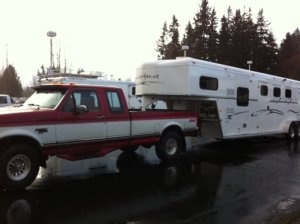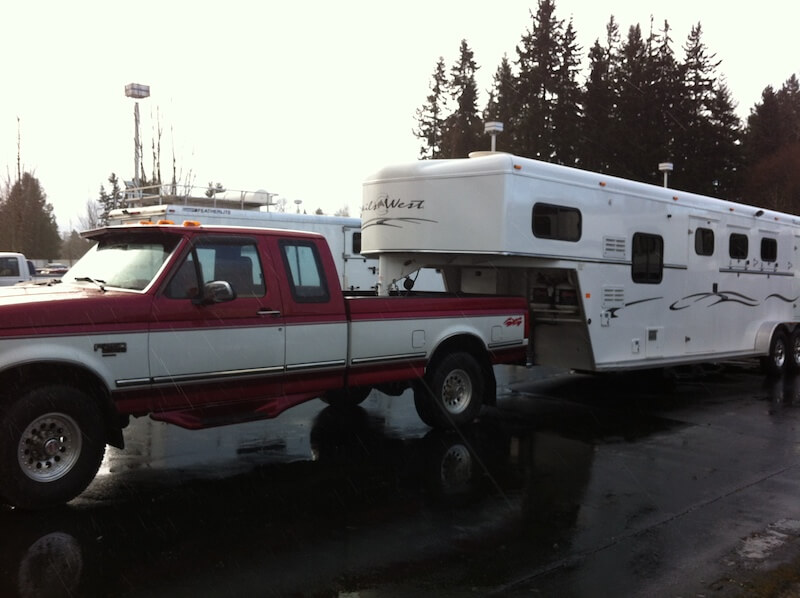How to Travel Safely with Horses
by Raye Lochert
Everyday untold numbers of tractor trailers motor down the road carrying materials from here to there. Before being entrusted with a rig weighing in the neighborhood of 80,000 pounds, truck drivers spend time in school learning about the working parts of their truck and trailer and how to maintain them. This includes doing a pre-trip inspection and how to strap and secure loads so they will arrive safely and not be a danger to other motorists en route. Several tons of load whizzing down the road at 60 miles per hour poses a significant danger if not responsibly handled and transported.
Horse owners are also embarking on something potentially dangerous—for themselves, their horse, and other motorists—when ferrying several thousand pounds of truck, trailer, and precious equine cargo from one place to another. If you have never traveled a significant distance with your horse it can be a little intimidating. You may have many questions before you feel comfortable loading up your horse and hitting the road. It is a good idea to follow the example of America’s truckers and learn some basics before doing so.
The Pre-trip Inspection
Let’s start with the truck. Check or change the fluids and make sure you have plenty of fuel. You should also check hoses, belts and air cleaners as well. These are simple inspections that any friendly mechanic can help you with if need be. Also inspect the condition of your tires(including the spare!), making sure they are not cracked or bald and are sufficiently filled with air. Lastly, take a second to check lights, turn signals and brake lights and then clean all the mirrors and windows so you will have unobstructed views.

Now on to the trailer. I like to start with the axles and make sure they have been lubed. Most trailers have simple grease fittings that allow you to easily grease them. While there, check the condition and the pressure of all the tires and the spare. Make sure the interior is clean, bee free, and there are no broken latches, torn padding or sharp edges. If your trailer has a wood floor it is very important that you pull out the mats and check for rotted wood. Having a floor board give way while hauling down the road can be disastrous. Hook the trailer to the truck and make sure the hitch is well lubricated and the ball size is correct. Connect the lights and check all signals, running lights and brake lights. It’s no fun trying to change lanes with a loaded horse trailer when your turn signals don’t work.
Load Securement
Long before your trip you should be practicing loading and unloading your horse. Make sure your horse is totally comfortable getting in and out and has taken short trips successfully. The more comfortable your horse is the less likely it will arrive with a stress related illness. If you use shavings, slightly dampen them to reduce airborne dust and flakes. Putting shavings in the trailer will encourage horses to urinate on long trips and soak up any urine or sweat improving traction inside.
Feeding your horse in the trailer on long trips can be beneficial as the chewing action will have a calming effect. It is a good idea to slightly dampen the hay to minimize dust. It also has the benefit of adding water to your horse’s system. Sometimes horses don’t drink while traveling. You can encourage them to consume more water prior to the trip by adding salt or electrolytes to their feed in the days leading up to the trip. When adding these items to your horse’s diet make sure they have plenty of fresh, clean water available. Don’t add these to your horse’s feed on the day of travel.
Roads can be bumpy, winding and you might have an occasional sudden stop. Therefore placing shipping boots and some sort of head bumper on your horse is cheap insurance. These items can decrease or prevent your trip becoming a nightmare. I also like to put a fly mask on to prevent flying objects from getting into my horse’s eyes. My personal preference is to tie my horse in the trailer and use the dividers. I feel the dividers give the horse support, allowing it to use less energy while traveling. Horses can build up a lot of heat going down the road so I have a garden thermometer in my trailer. This helps me know when to blanket my horses and when to open more windows. Air flow in the trailer is important, but not so much as to chill the horse or create flying dust.
Long Distance Horse Hauling
Once traveling, it is a good idea to stop every four hours and allow your horse to rest and drink, if they will, for about 20 minutes. How far you go each day is up to you. Horses can travel for many hours, but the shorter the better. Sometimes it just isn’t convenient to drive for two or more days and you need to push through. In this case you need to stop and allow your horse to lower his head and blow, something he does naturally and repeatedly, during the course of each day. In a trailer it is difficult to do so causing poor drainage of the nasal cavity. This can cause upper respiratory illnesses, including nasal discharge and coughing.
I have trained my horses thoroughly so I feel comfortable taking them out of the trailer at rest stops. If you chose to do this your horse must be well mannered under halter and not easily spooked by trucks, cars, people and dogs. If you have any doubts leave the horse in the trailer. A loose horse near the freeway is a recipe for a serious disaster.
When you arrive at your destination you should hand walk your horse for at least 15 minutes. This will get the blood flowing in the lower legs and stimulate the horse’s digestive system. Turnout in an enclosed space is great, if possible, so the horse can move freely and roll. After this settling time I move my horse to his home away from home and give him fresh water and feed, adding salt or electrolytes to his meal to stimulate him to drink. Once my horse has rested overnight he is ready to be my partner for the next adventure. Safe travels.
Published June 2013 Issue
Practical Horsemanship – that’s Raye. In an industry that’s exploding with information and trainers, Raye takes the confusion out of horse training. By taking a problem and breaking it down into smaller, doable steps, his solutions create successes for all horse people. No matter the discipline, the age of the horse or the level of experience or expertise of the rider, success is the end result.
There are many fantastic trainers in this industry. Unfortunately, a lot of what is being taught can’t safely be used by the average horse person. Raye wants to relay information in a way that makes sense and feels safe to everyone. If the horse handler finds it confusing or complicated, the horse doesn’t stand a chance.
In the vast sea of horsemanship clinicians, Raye is considered one of the most accessible teachers with an approachable style that truly sets him apart. His intense desire to help people achieve clear and consistent communication with their horses creates a much higher level of learning with his clients. No problem is too small and no question is silly.
In addition to clinics and lessons at Critter Creek Ranch in Santa Rosa, California, Raye travels all over the Western United States (including Hawaii and Alaska) conducting clinics, private lessons and demonstrations. His teaching is also available on DVDs and in special television programming. For more information on Raye Lochert and his schedule, visit Raye Lochert Horsemanship on Facebook.






